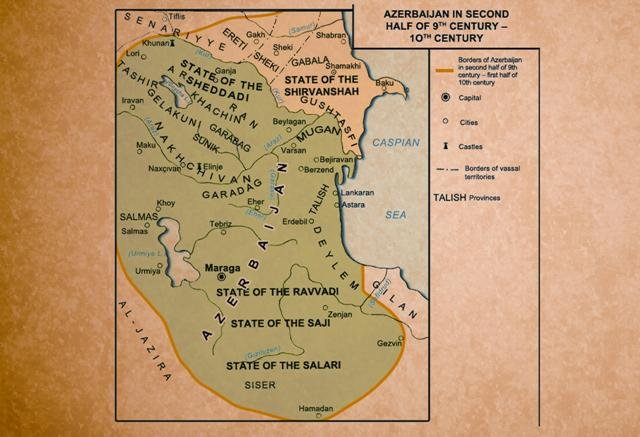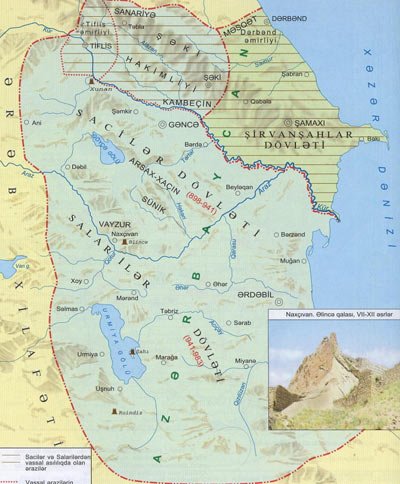Some States - Middle Ages - Azerbaijan
In the 9th-11th centuries, the Azerbaijani feudal states, such as Shirvanshahs, Shaddadis, Sacids, Salaris, Ravvadis, Atabeklar, Garagoyunlular and Aggoyunlu, were liberated from the Caliphate in the IX-XI centuries. In the book "History of Azerbaijan" published in 1994 (editors acad. Z.Bunyadov and Professor Y.Yusifov) were informed about these feudal states.
One of the feudal states that emerged in Azerbaijan in the 9th century was the state of Sajids (889-942), the city of Ardabil. Abu Sa'id was considered to be the founder of the new dynasty, and he was repeatedly tested in the battles of the Caliphate, and as a result of betrayal of Sahl ibn Sumbat, Babak was captured in Barzai, Afshin.
The Sacians were Turkish. Abu Sac Divdad and his successors, Mohammed and Joseph, took an active part in rebelling the rebellion against the Abbasids, who were governors of the Caliphate at different times.

Though the founder of the Sacids was considered Abu Sac Divdad, the state had long been born after his death in the days of Muhammad and Joseph. In 889, Mohammed was appointed as the judge of Azerbaijan because of the Khalifa's favor with his services. According to Tabarinin, he "immediately declared himself independent and immediately abandoned the Caliphate." However, sources indicate that Muhammad did not completely cut off his relationship with the caliph and would often have to enter into an agreement.
Muhammad disobeyed Maraga, who disobeyed him, and seized the city. Starting in 893, he successfully passed several successful marches to Yerevan, crossed Nakhchivan to Dvin, and captured the family members and close relatives of the Armenian judge I Sumbat, compelled him to compromise. From the victory, Muhammad appointed Judge Divadadi Armaniyah to his son, and went to Georgia and smashed Tiflis and other cities. These victories raised Muhammad's fame. The neighbors' judges began to flee from him.
The ability of Yusuf, a skillful military leader, to overthrow his opponents, strengthen his power, restore his previous political reputation, and implement the independence of Azerbaijan did not calm the caliphate in Baghdad. Therefore, the caliph sent him to the war against the rebellious rebellion against the Caliphate, leaving him "a dangerous journey" from the Second World War, leaving the provinces of Azerbaijan, Armani, Arran, Beylagan and other states governed by the Caliph during the Battle of Kufa on December 27, 927 Joseph's army was defeated, he was wounded, captured and killed.

Among the judges of the Sacids dynasty, Yusif ruled this state for 24 years, being the most influential of all. The Sacids state gained independence. The Azerbaijani lands were centralized, thereby creating a lot of ground for the revival of the economy, the development of cities, craftsmanship, trade and culture. His policy in the field of finance and tax boosted the country's economic recovery and population growth.
After the death of Joseph, the government was overthrown. In the era of his warrior Dayeem, Azerbaijan has again become a battlefield. In 942, the Sacids dynasty ruled Salari.
State of Salary. Since the founder of the state, Marzuban bin Mohammed, belonged to the Salaris tribe in the province of Kilan, the state was called Salaris. Marzuban ibn Muhammad, who laid the foundation of the state, was a very farsighted, intelligent, courageous, brave person, prominent statesman. He captured Azerbaijan in 942, defeating the Sacids Judge Deysem, as mentioned above. From that date, the government passed into the hands of the Salari dynasty (942-981). The capital of the Salarids was Ardabil.
The ruler of Salara, Marzuban ibn Mahammad, tried to strengthen his kingdom by having the lands of Azerbaijan under the rule of Sacids under difficult conditions. The growing young state faced a new disaster. In the sources, the so-called Russian tribes attacked Barda, the pearl of the Caucasus, due to the richness of nature and wealth. The people went to fight for the sacred land. The unprecedented slaughter and plunder began, beautiful buildings collapsed, the city lost its prestige. The judge who used this raid hit the town of Salmas in southern Azerbaijan. The governor ordered the defense of Barda to one of the superiors, and went to Salmis. His march was successful. Thanks to the victories in the wars, he drove the enemy from the south-western provinces of the country to the north-western provinces of Azerbaijan and to Armenia under his rule. Like the Sacids, Shirvanshah was subject to the Salarids of the Mazedis. The northern border of the Salaris extended to Derbent.
Mohammed ibn Shaddad, who was the founder of this state, was Kurdish. He began his political activity by living around the city of Dabil in the mid-X century. In fact, the Shaddadids state was formed during the Salarids and their territory. During the five years (948-953) of the Salary ruler Marzuban's captivity, the state was weakened during the rule of power between his successors. In the feudal ministers subordinate to him, independence tendencies became stronger. One such feudalist was Muhammad ibn Shaddad. He took advantage of the opportunity to be honest and declared himself independent. But he could not consolidate here. When Damascus recovered from captivity, Babyl Siddiq left. After his death, his sons Fazl and Lashkari came to Ganja and surrendered power here in 971 by expelling Salari Ibrahim's governor in Ganja. In the war, Abul-Hasan was not able to defeat Lashkariy, ruler of Salar Ibrahim ibn Marzuban closed it with him and was forced to officially recognize the Shaddadids state. Since 971, the Shaddadids state has begun to function. This event enhanced the authority of Lashkarini, which in a short time combined Berdini, Shamkiri, and Armania into his own state, and made peace in the country. During the eight-year rule, the Shaddadid state was consolidated and its territory expanded. His successor was part of Beylagan Shaddadis during the Fazlin era. Fazl, a clever diplomat, skillfully manages government affairs. According to the Arab historian Ibn al-Asir, "Kurdish Fazl attacked the Khazars in 1030. Many of them broke, captured and plundered large amounts of money."
In addition to successful foreign policy, Shaddadi Phaseh not only forgets about the country's domestic affairs but also cares for the development of craftsmanship, trade and culture. He attacked the bridge over the Araz River for commercial and military purposes. He cut money on his behalf in Ganja. Despite his kinship with Shirvanshah Manouchehr (1027-1034), friendship and kinship between Shaddadis and Shirvanshah were not stable. The Shaddai people often waged war with the Shirvanshahs, Ravvadites and Georgian judges.
During the reign of the great ruler of Shaddadis, Abû Laysar Shawur (1050-1067), the state was further consolidated. Shavur continued the war with Georgia and the Shirvanshahs in economic, social life and, in particular, through a series of useful reforms in the army. He has taken steps to protect the tribes of the tribes from the attacks of the neighboring feudal states and especially the Seljuk Turks, whose glory has been increasing day by day. A trench dug around Ganja and damaged it. At his request, Demirci Ibrahim built the gates of Ganja in 1063. In that year, he made several marches to Shirvan and received 40,000 dinar from them. However, due to the change of political situation, the Shavr's government was forced to accept the masculinity of the Seljuks.
He continued to struggle against the Seljuk Sultanate, the last Emperor of the Shaddei Empire, Fazl (1074-1088). "According to the sources, Selcuk Turks, who created a powerful state in the Middle East and Transcaucasia, regarded the internal independence of Shaddadis as a threat to themselves Therefore, the Sultan of Seljuk Maliksha sent his armed chief Buchan to Ganja with his army captured Ganja in 1088 and sent to Baghdad, captured Phase III in 1088. He died in captivity in 1091. Thus, the history of the Shaddadid state in 1088 ended.
Posted from my blog with SteemPress : https://yasasteemit.000webhostapp.com/2018/11/some-states-middle-ages-azerbaijan
This post has been upvoted for free by @millibot with 5%!
Get better upvotes by bidding on me.
More profits? 100% Payout! Delegate some SteemPower to @millibot: 1 SP, 5 SP, 10 SP, custom amount
You like to bet and win 20x your bid? Have a look at @gtw and this description!